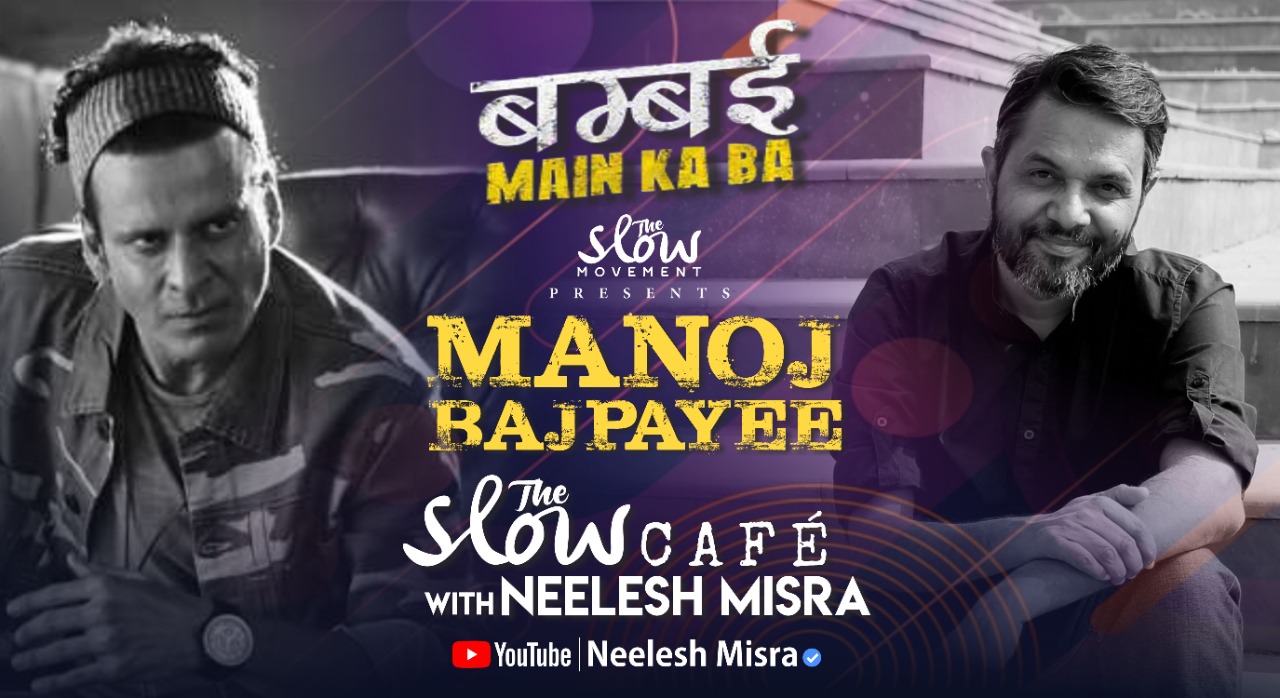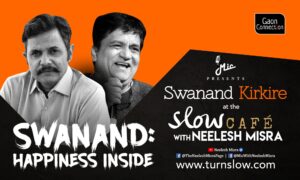For some reason, ‘Bambai Main Ka Ba’, written by Dr Sagar, performed by Manoj Bajpayee and directed by Anubhav Sinha, immediately brought to mind Rabindranath Tagore’s Kabuliwala. What if you reimagine the story and focus on what Kabuliwala has left behind, what if he can only yearn for a Mini, and never get a chance to shower his affection, because of societal inequities and the fact that he belongs to an ‘invisible’ workforce? ‘Ka Ba’ is what you get when the ideas of ‘missing’ and ‘regret’, a gentle thread in Tagore’s story, become the mainstay.
Listening to Bajpayee speak to Neelesh Misra on The Slow Cafe only reinforces this idea. Bajpayee is 51 now, he left home in Belwa, East Champaran, when he was 18. “Technically, I should have forgotten that life, but it’s still fresh and keeps calling me back.” And even today, the ace actor said he cohabits two different worlds; he might speak Hindi and English, but thinks in Bhojpuri. He’s the outsider in Mumbai, and back home too, he’s no longer the insider. “A friend told me I am the Krishna to his Sudama; I told him that we are both Sudamas,” said the National Award-winning actor.
Bajpayee was in Uttarakhand with his family during the initial phase of the novel coronavirus disease (COVID-19)- induced lockdown. And that was when he saw the images and videos of migrant workers walking back home. One image struck him especially hard — that of a little child sleeping on a strolley suitcase as his mother pulled him along the highway. “It refused to leave me,” Bajpayee said. And so he wrote a verse, wondering what the child saw during that long journey of his, what were the routes his journey home took, what questions he would ask when older, what does the mother think.
During the 40-minute conversation, peppered with scenes from the rap video and visuals of the migrant workers’ long walk home, Misra is as much the listener as we are, stepping in only to gently nudge the conversation that flows naturally. Bajpayee delved deep into his life to speak of how, in one sense, all of us who leave “home” behind are pravasis, migrants.
“When I first read the poem, written by Dr Sagar, it shook me. After a long time, I was reading something with powerful words, thought and emotion. After the video came out, I got calls from France, Toronto, London… with everyone saying this is our story too.”
The migrant is a unique person who does not belong anywhere — he’s stuck in the middle. The place and people he left behind don’t see him as their own anymore, and he does not belong to the place he’s moved to, too. He craves acceptance, and does not accept himself too. “But, he feels safer in the home he left behind.”
Bajpayee confessed he does explore the idea of going back “home” but his wife tells him he won’t be able to. “She knows. She saw her father try to go back to Unnao from Delhi, and never really go. She understands the pain of a migrant,” he said.
The lyrics speak of emotions Bajpayee identifies with, and has experienced over the years. In between, he recited the lines that speak of how while the migrant worker has two acres of land back home, he sleeps in a tempo and how life is stuck between the struggle for salt, oil and shampoo. And, how, instead of hot rotis fresh off the griddle, and fragrant litti-chokha, he eats vada pav on the go.
Misra slipped in a thought of what people left behind and what they are searching for… and Bajpayee said that nostalgia is a word that captures this perfectly. “You hold onto something, but things have changed. People have either left or grown older, the way they see you has changed. I am exhausted telling people that I am the same person who left. The past is something you go in quest of, but you never really find it to hold on to it.”
The changes in people who leave can be internal or external. “I used to jump in the village pond and swim for hours. Now I wonder how I did that, the water is dirty. I wish to be one of them, but things tell me that I am not one of them, the people tell me I am not from there. But do we belong to the places we have moved to? Not really, we keep moving with people who are like us, our comfort zone. You find people from your state, your culture to move with. It’s a strange conundrum.”
This is why Bajpayee travels extensively with new friends, goes to their homes, shares a meal. “I try my best to avoid the ghetto mentality. I believe that If I accept people, they will accept me. If not, I will be an outsider both in the village and city.”
Bajapyee then spoke of language. Of how he cannot speak to his mother in Hindi. Of how he can speak to Misra in Hindi, but he has to mind the tenses and the gender markers; speaking in Bhojpuri is without this “pain”, it flows.
What about the next generation of migrant? Will they hold on to their parents’ past? “We should not force our thoughts on them. Their understanding, their world is different. My daughter grows up in Maharashtra, she takes some things from us, but she’s not me.”
Eventually, the conversation veered towards social inequity. About how all the inequality is hidden behind the glitz of cities. “I think, now, our eyes have been opened. We usually move so fast from one thing to another, but not this time. This has been a life-defining period.”
And so, while thought processes change, while visuals try and create an impact, the migrant worker’s life continues to be much like what Dr Sagar writes: There’s no one to share grief with, no family to hug, people who scold without reason… each day I waste and fray, like a wick lamp that burns away.”



















